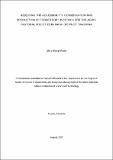Assessing the accessibility, conservation and production of fodder for livestock for the agro pastoral societies in Magu district, Tanzania.
Abstract
The access to adequate and high-quality livestock fodder has become a great challenge which
in turn threatens the sustainability of the agro pastoral societies in Magu district. This study
was done to assess the accessibility, conservation and production for the agro-pastoral
societies in Magu district, Tanzania. Systematic random sampling technique was used to
select the sample plots allocation and the households for interview in the study area. The
findings revealed that there are no significant differences in diversity and relative species
abundance between the highland and lowland agro-ecological zones (p = 0.009 and z = 45.5).
However, the results show significant differences in the diversity of fodder species between
the highland and lowland zones. Household survey was done to assess the accessibility,
conservation and production of livestock fodder. The results reveal that, seasonal variation
(dry and wet) shaped the accessibility of fodder within the agro-pastoral households.
Households land size, number of livestock, and physical capital indicated a positive influence
(p = 0.009, p = 0.083, p = 0.002 respectively) on the accessibility of fodder in the wet seasons
while, households’ land size, physical capital and the number of livestock (p = 0.000; p =
0.027; p = 0.075 respectively) indicated the negative influence during the dry season.
Households’ head level of education and income (p = 0.035; p = 0.087) show a greater
influence on the conservation of rangelands and fodder sources. Results also show that the
need for livestock feed and the need to protect the environment both motivate agro pastoralists to invest in fodder production however, poor assets households were more
interested in livestock feed than their counterparts. Therefore, this study suggests the need to
improve the community livelihood by enhancing households’ socioeconomic development
through extension services regarding fodder and livestock production

